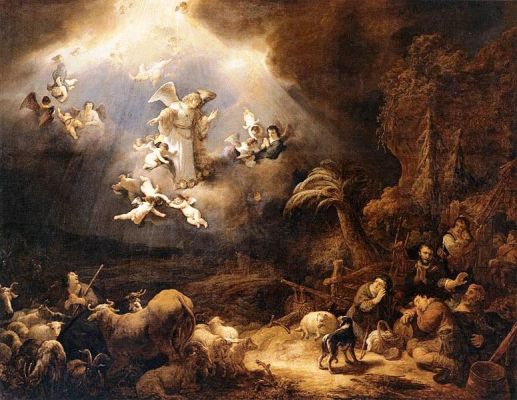 |
| "Angels Announcing the Birth of Christ..." (G. Flinck) |
Continuing this series on a progressive take on the birth of Jesus, Luke tells us that God's messenger responded to the fear of the shepherds with a standard Old Testament response, "Don't be afraid." Usually in the Old Testament, however, angels are sent to leaders and prophets, not to a bunch of shepherds (see a description of OT angelic visitations here). So, there are similarities between this story of angels and the Old Testament stories, and there is a difference.
This not being afraid message is important. In the year of our Lord 2012, it has a macro meaning and a micro one. The macro meaning has to do with the social gospel. As followers of Christ, we are called to be channels for hope, healing, and justice for those who are marginalized by society in one way or another. The ministry of Jesus of Nazareth impels us in that direction. On the micro level, following Christ is also about living fear-lessly, which is not an invitation to acting in foolhardy ways. If anything, it is an invitation to stop living foolishly—to stop living livers that are reactive, defensive, self-protective, and self-serving. The contrast here is between lighthearted and hard hearted. Faith lifts burdens from our heart, the kind of burdens that chain us to self-destructive behaviors of all kinds. Of course, it also adds burdens us in other ways as we learn empathy, but these burdens don't weigh us down with the ugliness of a hard heart. Again, I'm not claiming that this is the first-century meaning of the story, although I have to believe that first-century audiences saw that the appearance of angels to the shepherds valued common people in ways that the societies and political institutions of the Roman Empire did not.
According to Luke, the divine plan is for liberation of the poor. The Kingdom will be for them. That is the macro level. On our personal level, that divine agenda has real implications for our own personal lives. It calls us away from fear and hardness to trust and love. Amen.